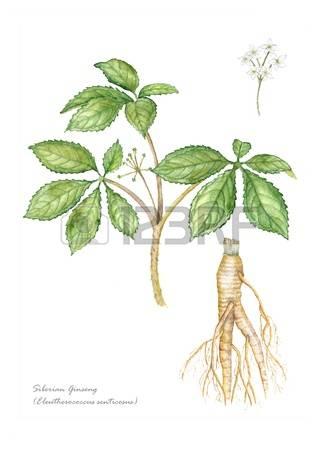Do You Know the Difference Between Korean Red Ginseng and Siberian Ginseng?
Korean Red Ginseng
Korean ginseng is also known as Panax, Chinese or Asian ginseng. It is the root of the plant that has been used for years in Asian cultures to help correct or prevent any disruption to the balance of the body and its functions. Korean red ginseng is panax ginseng that has been steamed and then dried out, where the steaming process appears to change some of the bioactive compounds and mimic some of the processes of activation that happen in the human gut. This can make their actions more reliable across individuals than fresh or white panax which is only air dried.
Siberian Ginseng
Siberian ginseng, also known by its scientific name of Eleutherococcus senticosus, is shrub, 2-7m high that is native to Russias far east. Siberian ginseng was spread to the west by the way of soviet athletes, who were using it to help improve their athletic performance. Its common name is misleading as it is not actually a part of the ginseng or panax family. The roots were discovered to have similar properties to panax ginseng in the 1950’s, when panax had been overharvested and was very expensive. The pharmacologists that studied it during this time, Dr. Brekhman, proposed the term “adaptogen” to describes its ability to increase non-specific resistance in the body.
Adaptogens
According to Brekhman adaptogens have 4 general properties; they are safe to use, its effects are non-specific, it protects the recipient from physical, environmental and chemical stressors and it acts to stabilize or normalize the health of the individual user. This term “adaptogen”, while originally used to describe Siberian ginseng, is now used to describe many other herbs with similar effects on the body, including Korean Red Ginseng. The term “adaptogen” has not been popular in western medicine due to its vague and imprecise explanation of the herbs actions. In 2001, a study was done on rats to try and examine the actions of eleuthero that would satisfy the western approach to health and medicine. It was demonstrated that Panax and Siberian ginseng appear to inhibit certain enzymes that break down stress hormones, allowing them to be active for longer and thus improve the body’s ability to respond and adapt to stress.
How the body responds to stress
A stress on the body refers to anything that can disrupt homeostasis or balance in the body. Whether the stress is that of a bear attacking you, a deadline at work, a poor diet, your body interprets this as stress and the general response is the same. When a stress is perceived by the body, this activates the hypothalamic-pituitary-adrenal axis or HPA axis, which describes the organs in the body that work together to help the body respond to stress. When the body is exposed to high intensity exercise, toxins in the environment, a virus or bacteria, a screaming boss, a physical trauma or surgery or anyone of the stressful events that we are exposed to everyday these organs produce a number of chemicals and hormones which helps the body adapt (eg. increases heart rate, constricts blood vessels, increase breathing etc).
Thus as an adaptogen which supports the HPA axis, Siberian and Korean ginseng can be used to support a number of physical and psychological conditions:
- Boosting the immune system
- Improving athletic and performance and recovery
- Recovering from illness or surgery
- Dealing with states chronic stress and fatigue
- Battling chronic diseases such as diabetes and heart disease.
- Dealing with inflammation or oxidative damage
Why would you take one ginseng over another?
While they are both adaptogens there are a few subtleties to consider when trying to determine when or why to take one and not the other. Generally speaking, panax ginseng or Korean Red Ginseng is a very stimulating adaptogen than Siberian ginseng. If you are suffering from anxiety and/or insomnia this may be too stimulating for you. Siberian ginseng may be a better option. Alternating doses of each may be a good option also as herbs all work on the body in slightly different ways and thus can have a better synergistic effect when used in combination. See your health care provider to know what adaptogenic herb may be best for you.
Sources:
Bleakney TL. Deconstructing an adaptogen: Eleutherococcus senticosus. Holist Nurs Pract. 2008 Jul-Aug;22(4):220-4
Gaffney BT1, Hügel HM, Rich PA. Panax ginseng and Eleutherococcus senticosus may exaggerate an already existing biphasic response to stress via inhibition of enzymes which limit the binding of stress hormones to their receptors. Med Hypotheses. 2001 May;56(5):567-72.
Lee SM, Bae BS, Park HW, Ahn NG, Cho BG, Cho YL, Kwak YS. Characterization of Korean Red Ginseng (Panax ginseng Meyer): History, preparation method, and chemical composition. J Ginseng Res. 2015 Oct;39(4):384-91